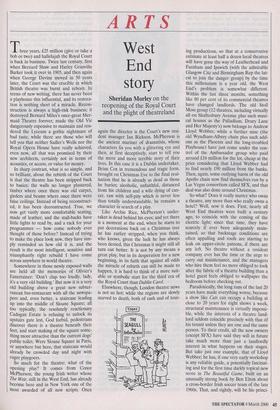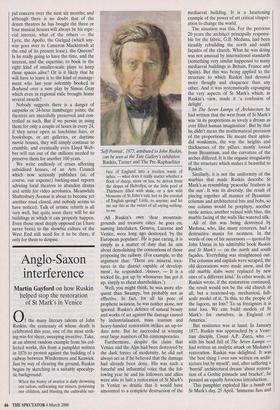ARTS
West End story
Sheridan Morley on the reopening of the Royal Court and the plight of theatreland Three years, £25 million (give or take a bob or two) and hallelujah the Royal Court is back in business. Twice last century, first when Bernard Shaw and Harley Granville Barker took it over in 1905, and then again when George Devine moved in 50 years later, the Court was the crucible in which British theatre was burnt and reborn. In terms of new writing, there has never been a playhouse this influential, and its restora- tion is nothing short of a miracle. Recon- struction is always a high-risk business; it destroyed Bernard Miles's once-great Mer- maid Theatre forever, made the Old Vic dangerously expensive to maintain and ren- dered the Lyceum a gothic nightmare of had taste, while there are those who will tell you that neither Sadler's Wells nor the Royal Opera House have really achieved, even now, all that was promised by their new architects, certainly not in terms of acoustics, or access, or value for money.
In sharp contrast, what is so simple, and so brilliant, about the rebirth of the Court is that the theatre has been stripped back to basics; the walls no longer plastered, timber where once there was old carpet, girders and beams where once there were false ceilings. Instead of being reconstruct- ed, it has been deconstructed. True, we now get vastly more comfortable seating, made of leather; and the stall-backs have little lights to read by, and a rack for your programmes — how come nobody ever thought of those before? Instead of trying to make the place look new, they have sim- ply reminded us how old it is, and the result is the most intelligent, sensitive and triumphantly right rebuild I have come across anywhere in world theatre.
Somewhere in those newly exposed walls are held all the memories of Olivier's Entertainer: 'Don't clap too loudly, lady, it's a very old building.' But now it is a very old building above a great new subter- ranean bar-restaurant with all the newspa- pers and, even better, a staircase leading up into the middle of Sloane Square; all too typically, the resolutely reactionary Cadogan Estate is refusing to unlock its upstairs gate lest, God forbid, pedestrians discover there is a theatre beneath their feet, and start making of the square some- thing more attractive than the current dogs' public toilet. Were Sloane Square in Paris, or anywhere but here, that staircase would already be crowded day and night with eager playgoers.
So much for the theatre; what of the opening play? It comes from Conor McPherson, the young Irish writer whose The Weir, still in the West End, has already become here and in New York one of the most awarded of all new scripts. Once
again the director is the Court's new resi- dent manager Ian Rickson. McPherson is the ancient mariner of dramatists, whose characters fix you with a glittering eye and then, at first deceptively, start to tell you the more and more terrible story of their lives. In this case it is a Dublin undertaker, Brian Cox in tremendous and tragic form, brought on Christmas Eve to the final real- isation that he is already as dead as those he buries; alcoholic, unfaithful, distanced from his children and a wife dying of can- cer, raw with self-pity which is never less than totally understandable, he remains a character in search of a play.
Like Archie Rice, McPherson's under- taker is dead behind his eyes; and yet there is a moment at the end, when he starts to put decorations back on a Christmas tree he has earlier stripped, when you think, who knows, given the luck he has always been denied, this Christmas it might still all turn out better. It is not by any means a great play, but in its desperation for a new beginning, in its faith that against all odds the miracle of rebirth can still be made to happen, it is hard to think of a more suit- able or symbolic start for the third era of the Royal Court than Dublin Carol.
Elsewhere, though, London theatre news is not so hot; while the regions are slowly starved to death, both of cash and of tour- ing productions, so that at a conservative estimate at least half a dozen local theatres will have gone the way of Leatherhead and Farnham and Ipswich (with the admirable Glasgow Citz and Birmingham Rep the lat- est to join the danger group) by the time this millennium is a year old, the West End's problem is somewhat different. Within the last three months, something like 80 per cent of its commercial theatres have changed landlords. The old Stoll Moss group (12 theatres, including virtually all on Shaftesbury Avenue plus such musi- cal houses as the Palladium, Drury Lane and Her Majesty's) now belongs to Andrew Lloyd Webber, while a further nine (the old Wyndham-Aibery chain plus such add- ons as the Phoenix and the long-troubled Playhouse) have just come under the con- trol of the Ambassador group who paid around £16 million for the lot, cheap at the price considering that Lloyd Webber had to find nearly £90 million from the banks. Then, again, some outlying barns of the old Apollo chain now find themselves run by a Las Vegas consortium called SFX, and that deal was also done around Christmas.
So what? Does it really matter who owns a theatre, any more than who really owns a hotel? Well, now it does. First, nearly all West End theatres were built a century ago, to coincide with the coming of the electric light; since that time, they have scarcely if ever been adequately main- tained, so that backstage conditions are often appalling and roofs are starting to leak on upper-circle patrons, if there are any left. No theatre without a resident company ever has the time or the urge to carry out maintenance, and the managers who hire them feel no more obliged to look after the fabric of a theatre building than a hotel guest feels obliged to wallpaper the bedroom before checking out.
Paradoxically, the long runs of the last 20 years have made everything worse; because a show like Cats can occupy a building at close to 20 years for eight shows a week, structural maintenance is virtually impossi- ble, while the interests of a theatre land- lord seldom coincide precisely with that of his tenant unless they are one and the same person. To their credit, all the new owners (except SFX) have said they will in future take much more than just a landlordly interest in what happens on their stages, But take just one example, that of Lloyd Webber; he has, if one very early workshop is any reliable guide, a potentially fascinat- ing and for the first time darkly topical new score in The Beautiful Game, built on an unusually strong book by Ben Elton about a cross-border Irish soccer team of the late 1960s. That, and rightly, will be his princi- pal concern over the next six months; and although there is no doubt that of the dozen theatres he has bought the three or four musical houses will always be his espe- cial interest, what of the others — the Lyric, the Apollo, the Gielgud (which any- way goes over to Cameron Mackintosh at the end of its present lease), the Queens? Is he really going to have the time, and the interest, and the expertise, to book in the right kind of smaller-scale plays to keep those spaces alive? Or is it likely that he will have to leave it to the kind of manage- ment who last year solemnly booked in Boyband over a new play by Simon Gray which even in regional exile brought home several awards?
Nobody suggests there is a danger of carparks or 24-hour hamburger joints; the theatres are mercifully preserved and con- trolled as such. But if we persist in using them for only a couple of hours in every 24, if they never open as lunchtime bars, or bookshops, or art galleries, or daytime movie houses, they will simply continue to crumble, and eventually even Lloyd Web- ber will run out of the millions needed to preserve them for another 100 years.
We write endlessly of crises affecting subsidised houses, of an Arts Council which now seriously publishes (at, of course, our expense) barking-mad reports advising local theatres to abandon drama and settle for video acrobatics. Meanwhile Shaftesbury Avenue is about to become yet another road closed, and nobody seems to have noticed. Talk of artistic rebirth is all very well, but quite soon there will be no buildings in which it can properly happen. Even those most deeply opposed (as I have never been) to the showbiz culture of the West End still need for it to be there, if only for them to despise.



































































 Previous page
Previous page